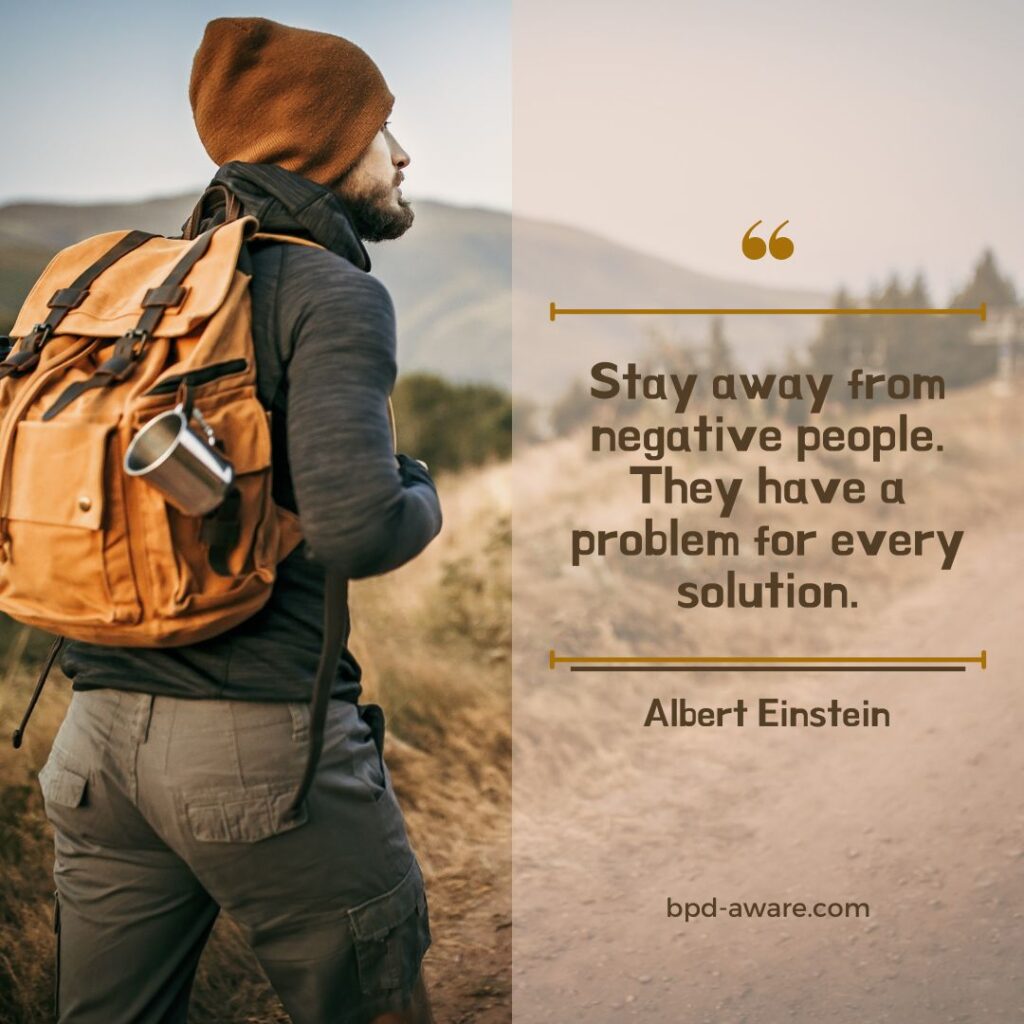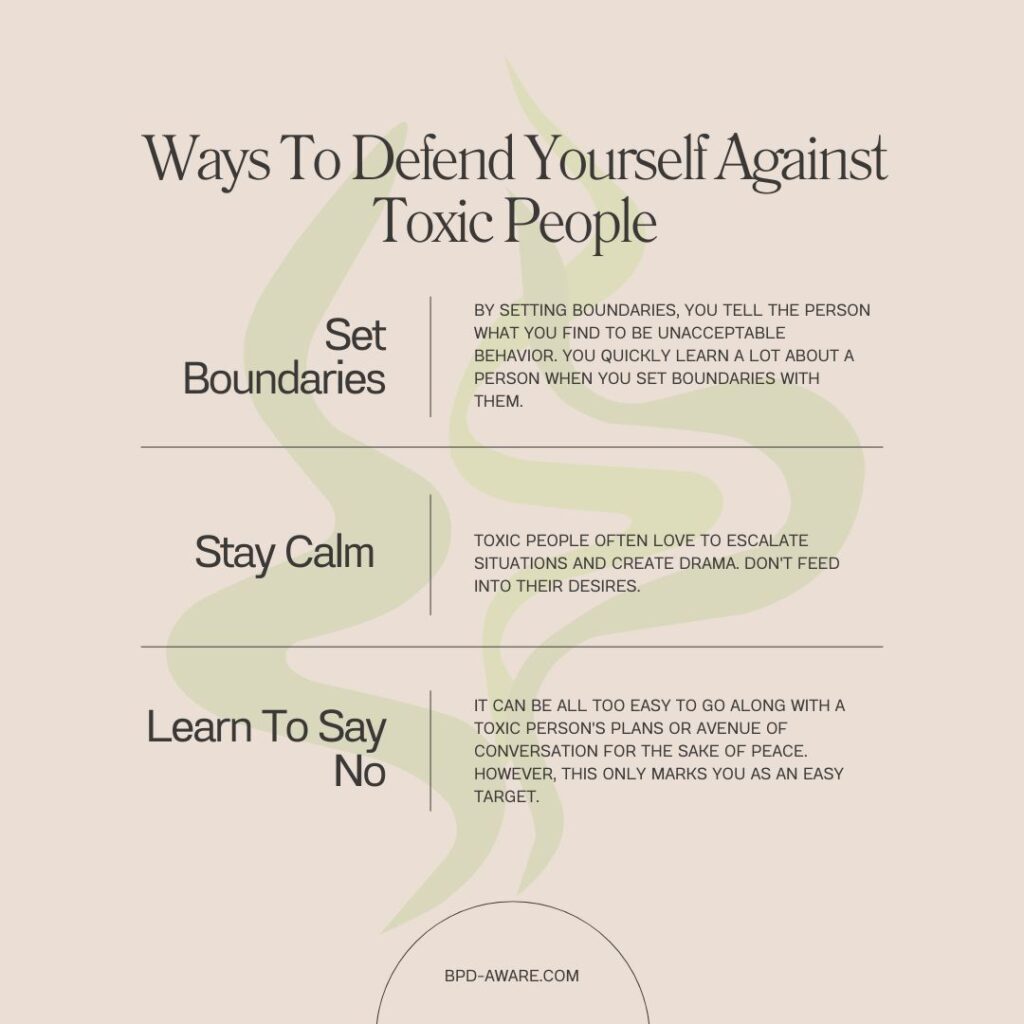Most of us know at least one toxic person. That person who constantly undermines you, makes you feel worse about yourself and leaves you feeling emotionally exhausted. It can be a family member, a so-called friend, a work colleague, a neighbor, or anyone else you are forced to spend time with.
People with borderline personality disorder (BPD) tend to know a little bit about toxic people. Many of us were raised by toxic parents or abused by toxic people from a young age. BPD is often a defense mechanism against abuse suffered from childhood. However, people with BPD can be toxic too. Their maladapted defense mechanisms can take the form of dishing out toxic abuse on others. It’s a classic case of the abused becoming the abuser.
Whether you have BPD and have someone toxic in your life, or you have someone in your life with BPD who is displaying toxic behaviors, there are ways to defend yourself.
But first, we have to more clearly define the traits and characteristics that make up a toxic person.
Toxic people:
- Disrespect your boundaries.
- Try to manipulate you into doing what they want you to do.
- Think they’re always right.
- Believe they’re the victim in every situation.
- Constantly criticize you.
- Are jealous of any success you achieve or any positive relationships you share with others.
- Create unnecessary drama and conflict.
- Be incredibly nice to some people while treating others like dirt.
- Leave you feeling drained.
Toxic people often appear warm and friendly at first, it’s how they draw others in and form a bond. Then, things start to change. Plans get canceled with little to no warning, boundaries start getting tiptoed over or outright ignored, and the toxic behavior escalates from there. Sometimes it happens so slowly that it can take you years to notice, other times it can change almost overnight.
Having toxic people around you when you have BPD is only going to make your condition worse and ruin any chances you have of making a recovery. Likewise, if there’s someone in your life who has BPD and is a toxic person who shows no signs of change, they’re going to cause you untold damage to your mental and physical health.

Ways To Defend Yourself Against Toxic People
Set Boundaries. Setting boundaries can provide important information to both parties in a relationship. As mentioned earlier, toxic people will often try and push boundaries or ignore them altogether. By setting boundaries, you tell the person what you find unacceptable behavior in your relationship. It’s not uncommon for someone to make a mistake once or twice but a repeated pattern of breaking boundaries will let you quickly know whether or not someone is toxic.
Click here to read more about how to set healthy boundaries with people.
Pay Attention To How They Make You Feel. If you leave the vast majority of interactions with someone feeling drained or negative then there’s a good chance they’re a toxic person. Everyone goes through bad times or has an off day, but you need to look for patterns of unpleasant interactions. You may even want to write down these interactions in a journal so you have a reminder of how they went.
Identifying a toxic person is half the battle. Once you’ve identified someone as toxic, you can use more of the techniques listed below.
Try Talking To Them. Sometimes, people don’t realize how their behavior affects other people. They’re so wrapped up in their own little world that it comes as a surprise to them that the things they do are actually a source of pain.
Sit down and talk with them about some of their actions and how they’ve negatively affected you. Try to be calm, open, and honest with them so you can avoid them feeling like they’re being attacked. Use neutral “I statements” to help this goal by using statements like:
“I value honesty, so I can’t continue our relationship if you continue to behave in this way.”
“I feel uncomfortable when you talk about other people in the way and I won’t take part in conversations like that.”
Limit Interactions With Them. One of the easiest ways to minimize the damage a toxic person can do to you is to limit your interactions with them. This can mean increasing the physical distance between you and the toxic person, reducing the amount of communication, or making yourself unavailable. It’s good to always have an excuse to hand if they try and open up the lines of communication with you.
“I can’t talk right now. I have an assignment I need to finish.”
“I’ve got so much work to do that I don’t have time to talk at the moment.”
They may try to escalate at this point and create a fake crisis to draw you in and make you feel guilty for stonewalling them. This is a classic hoovering tactic and your best response is to stay calm and not get drawn in.
Stay Calm And Don’t Get Drawn In. Toxic people often love to escalate situations and create drama. Don’t feed into their desires. Respond to them calmly and don’t get drawn into the conflict they’re trying to create. This can be difficult to do, especially if you have BPD and issues with emotional regulation. However, with practice, it can be learned. When the toxic person learns that they can’t rile you up, they soon become bored and look for other sources of drama.
Learn To Say No. You are a person with your own wants, needs, and desires. It can be all too easy to go along with a toxic person’s plans or avenue of conversation for the sake of peace. However, this only marks you as an easy target. If you’re willing to go along with one small thing, they’ll soon have you bending over backward for them!
“No, I can’t do that.”
“I don’t think that’d be appropriate.”
Remember, you don’t have to give a reason or excuse for why you’re saying no. You’ve made a choice and you don’t need to validate your reasons for their benefit. When you give an excuse, it can be twisted back around on you and make the situation more difficult.
Saying no can be very difficult, particularly if you’re a people pleaser. It can help to spend a little time practicing in the mirror to build up your confidence and assertiveness.
Go No Contact With Them. In extreme cases where the above options haven’t worked, you may want to consider going no contact with the toxic person. This isn’t always possible, depending on the nature of your relationship with the person, however, it is the most powerful way to avoid toxic abuse. When you cut someone out of your life, you aren’t giving them the chance to play games with you anymore.
The no-contact option can cause a great deal of friction, especially when it’s used with a family member. Expect them to try and guilt, shame, or badmouth you to other people. Do not give in to their attempts to make you appear to be the bad person in this situation. You know the truth of the situation.
Seek Support. Having a toxic person (or people) in your life can make you feel like you’re going crazy. Having a support network of friends or family members you can trust and talk to about the situation can provide emotional support and practical advice on dealing with the situation. Seeking a therapist is also a good idea if you are able to do so. A therapist will listen to your issues and provide tools and techniques that boost your ability to deal with the toxic person.

Final Thoughts
If you’re in a relationship with a toxic person, you know the pain it can cause. Many people with BPD have had toxic people in their lives who are at least partly to blame for the formation of their symptoms. Sadly, having BPD can also lead to toxic behavior in some people with the condition.
No one should have to put up with people who are consistently abusive and toxic. It’s one thing if someone is working to improve their flaws, but those who ignore or even celebrate them are just not worth your time. They’ll do their level best to drag you down into their world of misery and care little for how that impacts you.
It’s very challenging to cope and deal with toxic people and it can be tempting to just placate them and let them have their way. This will only embolden them though and signal to them that you’re happy to be their plaything. The best way to ruin their game is not to play it at all.
Sources, Resources, and Further Reading
- Toxic People: How to Cope, Protect Yourself, and Know When to Give Up: https://thetherapistgroup.com/2013/10/toxic-people-how-to-cope-protect-yourself-and-know-when-to-give-up/
- Do’s and Don’ts for Dealing with Toxic Behavior: https://www.healthline.com/health/how-to-deal-with-toxic-people
- How Emotionally Intelligent People Handle Toxic People: https://www.talentsmarteq.com/how-emotionally-intelligent-people-handle-toxic-people/
















